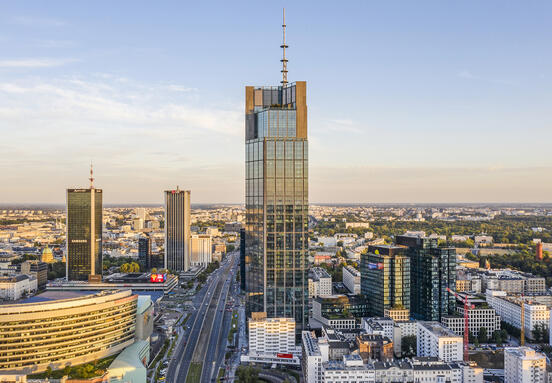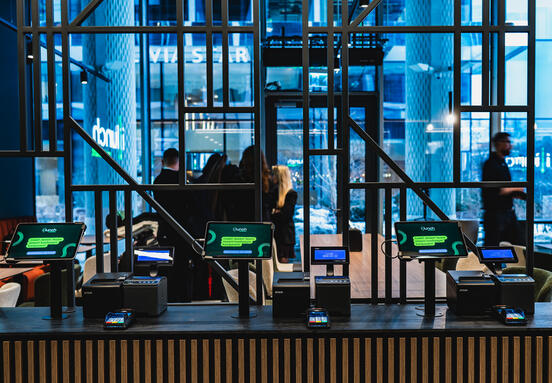At the end of June, Warsaw offices totaled 6.27 million sq m. In terms of supply, the quarter was dominated by two buildings built by PHN, and the market grew thanks to them by 35.6 thousand. sqm surface. First, at the turn of March and April, the occupancy permit was collected by the Intraco Prime office building, which, as predicted, will welcome its first tenants in the third quarter of 2022. A few weeks later, an occupancy permit was issued for the taller SkySawa building, PHN's flagship project. At the beginning of the year, the owner finalized a long-term lease agreement for the entire area of the complex at ul. Świętokrzyska to PKO Bank Polski. According to the plan, the space will be delivered to a new tenant in the first half of next year.
Due to the successively recovering demand, over 212,000 sq m was managed in the capital in the second quarter. sqm surface. This is another quarter in which the demand for Warsaw offices exceeded the level of 200,000 sq m. sqm The result between April and June is over 45 percent. higher than in the corresponding period of the previous year. Moreover, since the beginning of the year, lease agreements have been signed in Warsaw for nearly 480,000 sq m. sqm., which constitutes 75 percent. total demand from 2021. The authors of the report indicate that in the second quarter, a significant increase in the percentage of contract renewals was noticeable in the demand structure. They accounted for 48 percent. the total pool of contracts, by 21 percent. more than in the first quarter of the year. Experts of BNP Paribas Real Estate Poland forecast that
The second quarter continued the trend from the beginning of the year. We are talking about high tenant activity and the finalization of transactions held up by the uncertainty related in the first place to the further effects of the pandemic in the office environment. However, there is no question of hyperoptimism, changes in the office market were also taking place in the shadow of the war on the territory of Ukraine, with galloping inflation and the specter of a slowing economy and a recession on the verge. Some tenants decided to stay or relocate, taking into account the consequences of the supply gap, pressure to increase rents, as well as expecting an increase in the cost of space arrangement and possible delays - says Dorota Mielke, associate director from the Office Leasing Department, BNP Paribas Real Estate Poland.
The shrinking amount of available space and increased demand resulted in a decrease in the vacancy rate to the level of 11.9%. from 12.2 percent listed at the end of the first quarter. In the analyzed period, three office zones - Mokotów, Centrum Północ and Korytarz Żwirki i Wigury - recorded an increase in the percentage of vacant space. In the second zone, it was caused by the commissioning of the Intraco Prime office building, which as at the commissioning date had 17 percent. vacant space.
In the last quarter, offices were leased primarily by companies from the technology and services sectors. The list with the largest transactions in terms of leased space opens with a contract extension for 21,000 sq m. sqm in the Warsaw Spire building by Samsung. The second is the rental of nearly 10 thousand. sqm by the National Agricultural Support Center in the Karolkowa Business Park complex. The three largest contracts also include the extension of the contract for over 9,000. sqm by an IT company at the Warsaw Financial Center.
Today we can see how rental rates are increasing from offer to offer, how lease periods are lengthening, which factors will shape the demand for Warsaw offices in the near future. Today, to cover fit-out costs, which on average amount to between EUR 800 and 850 per sq m, from the developer state, companies decide to enter into new contracts with a minimum length of 7 years. And all this in the face of the supply gap and the big challenge for developers, which will be planning new projects in conditions of limited time and cost predictability. As a result, the market will witness consolidation processes, the foundations of which will include, for example, the expectation of redefining hybrid work and adapting it to today's and tomorrow's realities. It is also an important moment for consulting companies operating on the real estate market, which should boldly go beyond the existing patterns of cooperation with clients. The multi-level consulting and comprehensiveness of the proposed solutions will be invaluable - comments Małgorzata Fibakiewicz, head of Business Intelligence Hub & Consultancy, BNP Paribas Real Estate Poland.








